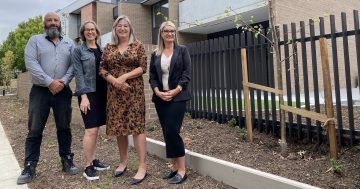
Housing ACT says tenants like Ann will move to new, modern residences. Photos: Public Housing Renewal Taskforce.
Charnwood public housing tenant Ann received a letter last week that broke her heart.
The 55-year-old disability pensioner was told that after 33 years in the same house, she would have to leave so the site could be sold or redeveloped as part of the ACT Government’s public housing renewal program.
Her situation typifies the challenges many tenants will face and what Housing ACT faces in managing people who may be vulnerable and have special needs.
Her daughter Jessica Buckley, who grew up in the three-bedroom property, says her mother is distraught at the thought of moving out of the neighbourhood.
“It feels like someone has died,” she said.
Ann’s life has not been easy. She has cerebral palsy and had to rebuild her life after divorcing a compulsive gambler, raising three children on her own.
She worked for 15 years as a shop assistant, but her deteriorating health forced her to go on to the pension three years ago.
She has been diagnosed with diabetes and finds any change difficult.
Jessica says all her community connections and needs are met in Charnwood, including her local doctor.
Even the neighbours do not want her to leave, she said.
“One has been there more than 33 years and have been like grandparents to us, and the other neighbour has been there for more than 20 years,” Jessica said.
It’s also a bitter blow considering how much Ann and her family have done to make the property a home and maintain it.
“We sanded back the walls to do a proper job of painting rather than when they’ve just slapped paint over the top of other paints that would constantly flake and peel,” Jessica said.
“There was no carpet underlay so we ripped up the carpet and had proper carpet installed.
“The yard was overgrown with ivy, so we ripped all that out and tried to level the yard. If we saw anything we could do to improve it, we did it.”
The home has been a source of stability for not just Ann but also her children and grandchildren.
Jessica, 34, moved out at 18 when she had her daughter, but moved back in at 23, only leaving three years ago. Her two brothers also have children.
“I visit a couple of times week. My mum still looks after the grandkids regularly,” Jessica said.
“It’s nice to have that backyard to run around and play in.”

Another example of new public housing.
Jessica acknowledges that her mother sometimes finds the house hard to manage because of her cerebral palsy but always reaches out to friends and family.
Leaving her community will be tough, but the family is beginning to come to terms with the situation, admitting fighting to stay will be hard.
“We’ve been talking to people whose parents have been through the same situation and have had a positive outcome,” Jessica said.
“If she has to move, she wants to stay in Charnwood,” Jessica said.
“It’s going to be very challenging trying to find something that suits her needs.”
Jessica says that if it is outside their control, it may be best not to hold on and be overwhelmed but work towards the best possible outcome and a smooth transition.
There is also the outside chance of being able to buy the property, but the family won’t know anything until they speak to a relocation officer.
Housing ACT began delivering letters giving notice of relocation on 21 February but insists eviction will be the last resort. It will also offer support and legal advice through community organisations.
“Housing ACT is committed to supporting tenants before, during and after their move,” a government spokesperson said.
“We work closely with tenants, their support networks and community service providers, as part of an extensive engagement process, to relocate tenants to alternative housing.
“The relocation of tenants includes identifying individual support needs, finding the right home, help with moving, and ensuring access to any supports needed after moving.”
The older properties will be sold to generate funds for reinvestment or redeveloped to provide modern, energy-efficient homes.



















